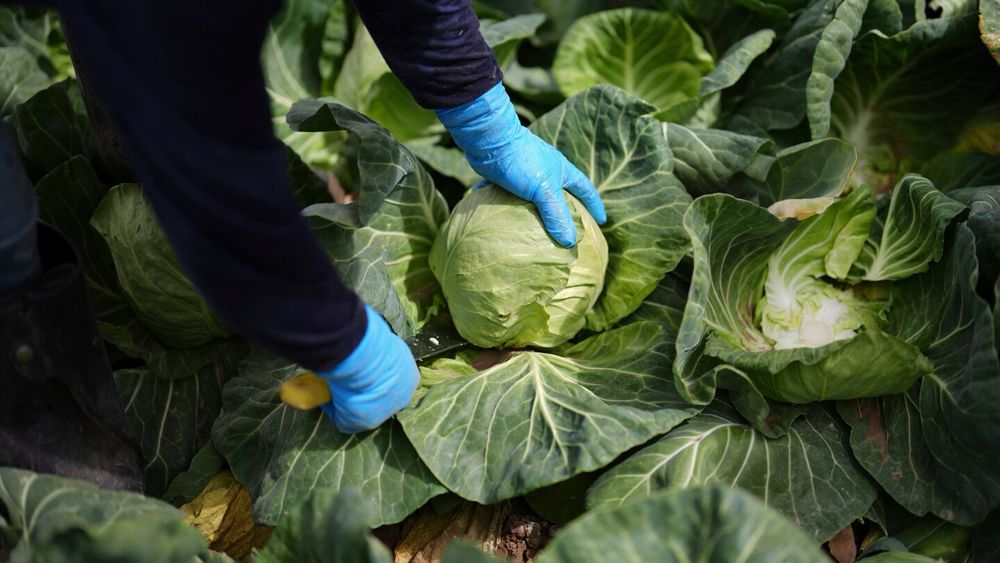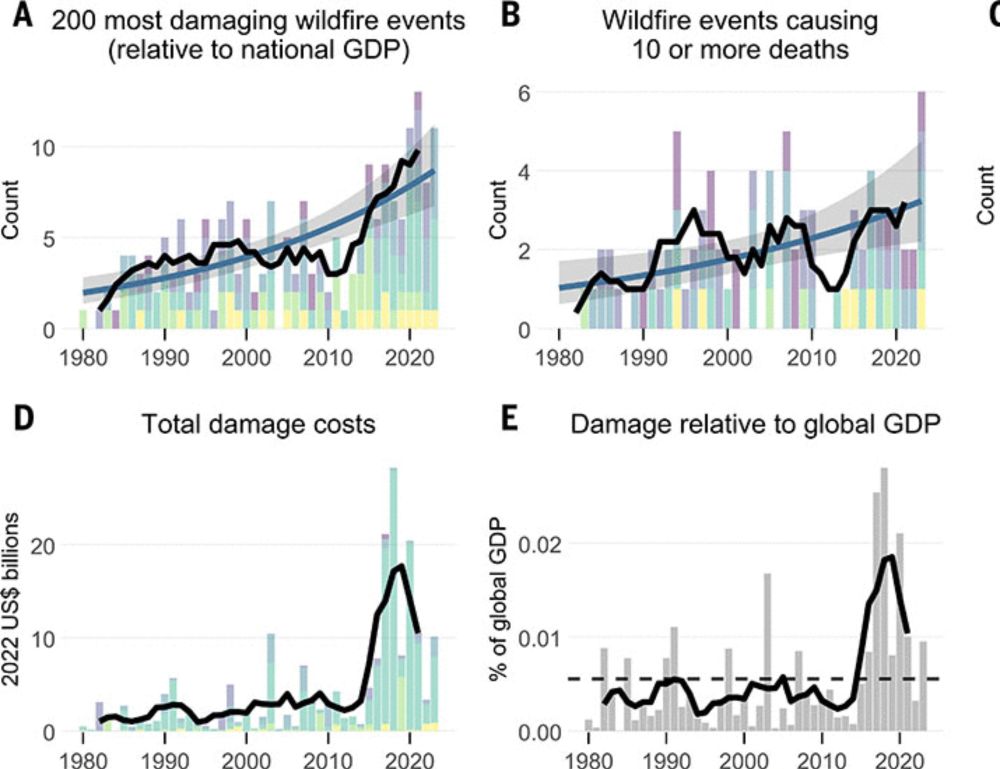The map shows the spatial pattern of median conditions for the selected month, while the lower panel tracks how the season may evolve at your chosen location.
20.11.2025 13:35 — 👍 0 🔁 0 💬 0 📌 0
You can:
• Jump between different ski resorts (like Myrkdalen in the screenshot)
• Switch to major Nordic cities
• Or just click anywhere on the map to get a local forecast time series for that spot
20.11.2025 13:35 — 👍 0 🔁 0 💬 1 📌 0
The tool uses ECMWF’s 51-member seasonal ensemble and summarises the range of possible conditions each month.
In the time series you see the 5th, 25th, 50th, 75th and 95th percentiles, so you get a sense of the spread.
20.11.2025 13:35 — 👍 0 🔁 0 💬 1 📌 0

Winter has arrived properly in Norway this week ❄️ After a few days of heavy snow it already feels like mid-season, so it’s time to look a bit further ahead.
I’ve built a small interactive tool to explore ECMWF seasonal snow forecasts for the Nordics:
climatecompass.shinyapps.io/Snow_Depth_F...
20.11.2025 13:35 — 👍 1 🔁 0 💬 1 📌 0

On car sizes
13.11.2025 11:35 — 👍 3 🔁 3 💬 0 📌 0

We all get poorer every time a climate disaster strikes
Long-term economic effects of global warming could be far greater than thought, making many countries poorer and hurting even those of us spared direct impacts
Sarcasm aside, it's perhaps worth pointing out that the evidence suggests that weather disasters reduce economic growth for decades - the idea that there's rapid bounceback, or even extra growth stimulated by recovery, has proved wrong
www.newscientist.com/article/mg23...
22.10.2025 13:34 — 👍 59 🔁 29 💬 3 📌 1

Post from Threads user rodneyowl: "Ireland has declared the Basic Income for Artists scheme permanent. This will be officially announced in tomorrow’s budget. Details to follow. Congratulations to all who fought for it and the present and future artists of all sorts in Ireland. That includes me 👌We’re just comin to the end of a 3 year pilot scheme. It’s been a roaring success. For every €1 paid out to the 2000 participants, the government got €1.46 back. Can’t argue with that. Other countries are already taking note."
Damn. This is amazing. £325 per week, paid monthly, for 3 years - and the result was a profit for the Irish economy:
www.citizensinformation.ie/en/employmen...
06.10.2025 22:03 — 👍 15597 🔁 5300 💬 130 📌 800

A recipe for avoiding 15 million deaths a year and climate disaster is fixing food, scientists say
Scientists are presenting new evidence that the worst effects of climate change can’t be avoided without a major transformation of food systems.
A reality check for me was working with students on an internal carbon accounting platform that Bon App our food provider uses. Beef was less than 5% of our purchases but around 50% of our food emissions even with international work to be plant forward.
apnews.com/article/plan...
06.10.2025 22:24 — 👍 41 🔁 14 💬 1 📌 1
The real headline is there in the article:
“The wealthiest are increasing their wealth faster than any other group.”
That’s the story. Not the meaningless number.
06.10.2025 06:59 — 👍 1 🔁 0 💬 0 📌 0
So when we say the richest 1% hold $52 trillion, we just check out. It sounds like monopoly money.
We’re not wired to understand exponential scales — and that’s exactly how the story slips past us.
06.10.2025 06:59 — 👍 0 🔁 0 💬 1 📌 0
Who has a sense of what $52 trillion means?
It’s too big, too abstract. Even billion vs. million is a scale most people can’t intuitively grasp — a billion seconds is 31 years; a million seconds is 12 days.
06.10.2025 06:59 — 👍 0 🔁 0 💬 1 📌 0
Growing wealth inequality is devastating for societies.
But with headlines like “the wealth of the top 1% reached $52 trillion”, the topic gets ignored — because those numbers mean absolutely nothing to anyone.
06.10.2025 06:59 — 👍 2 🔁 0 💬 1 📌 0
I am happy to announce that we received major funding from Schmidt Sciences under their VICC program to study rapid #Permafrost Thaw Carbon Trajectories (PeTCaT). The 5-year project led by my team @awi.de partners with an international team to quantify how rapid thaw contributes to climate change.
03.10.2025 06:13 — 👍 12 🔁 3 💬 1 📌 0

By applying a tracking method to both climate models and satellite data, @davyclimate.bsky.social found that sea ice age is a more sensitive indicator of change than ice thickness or volume.
🧪🌊 Read the publication here: agupubs.onlinelibrary.wiley.com/doi/epdf/10....
02.10.2025 10:42 — 👍 6 🔁 3 💬 0 📌 0

From a poster called “just shower thoughts“ reading: when people talk about traveling to the past, they worry about radically, changing the present by doing something small, barely anyone in the present to really thinks that they can radically change the future by doing something small.
I may have found my defining quote.
Pair this with my pinned post and you will see what I mean!
29.09.2025 12:22 — 👍 1778 🔁 475 💬 25 📌 20
Thanks to the fantastic team at NERSC, Jakob Dörr, and Philipp Griewank.
If you’re working on climate dynamics, prediction, or sea ice processes, I’d love to hear your thoughts on how sea ice age could play a role in your work.
#Arctic #SeaIce #ClimatePrediction #ClimateModels #ESA #SAGE
24.09.2025 08:27 — 👍 1 🔁 0 💬 0 📌 0
This work also launches us into our new ESA project, SAGE, where we’ll dig deeper into how sea ice age can reshape the way we evaluate and improve climate models. Stay tuned. 🌍❄️
24.09.2025 08:27 — 👍 1 🔁 1 💬 1 📌 0
Most exciting: sea ice age reveals low-frequency variability in the Arctic (see Fig. 5 in our paper). This opens a new window into decadal-scale fluctuations — crucial for improving #ClimatePrediction systems.
24.09.2025 08:27 — 👍 1 🔁 1 💬 1 📌 0
For the first time, we applied the same ice-tracking algorithm to both model output & satellite observations. This fair, like-for-like comparison reduces long-standing biases and shows that sea ice age captures dynamics thickness & volume alone cannot.
24.09.2025 08:27 — 👍 0 🔁 0 💬 1 📌 0
Sea ice age is more than just a number — it integrates the dynamic + thermodynamic processes shaping Arctic sea ice. Unlike area or thickness, it can’t easily be tuned in models. Age emerges from the cumulative history of growth, melt & drift. A tough benchmark for climate models.
24.09.2025 08:27 — 👍 0 🔁 0 💬 1 📌 0
I'll be talking this afternoon about challenges in interpreting and making fair comparisons of sea ice age between climate models and observations, and demonstrating one way to resolve this using a common definition of sea ice age (paper out soon).
19.09.2025 07:13 — 👍 1 🔁 1 💬 0 📌 0

@signeaaboe.bsky.social kicking off the Sea ice Age (SAGE) project webinar to discuss current challenges and opportunities in using age to monitor sea ice change.
docs.google.com/forms/d/e/1F...
#ESA #SeaIce
19.09.2025 07:13 — 👍 2 🔁 1 💬 1 📌 0
If you had the opportunity to educate the sustainable investing community about one fact, what would you want ensure it knew, above all else? My nomination: The large-scale, economy-wide asset devaluations that economists & climate scientists say will ensue if we fail to accelerate decarbonization.
05.09.2025 14:30 — 👍 7 🔁 4 💬 1 📌 0
Those late summer rains do make for a dramatic sky
03.09.2025 07:45 — 👍 2 🔁 0 💬 0 📌 0

very intense night in Greenland a few days ago. I say 'night' because this light lasted all night.
02.09.2025 13:08 — 👍 873 🔁 118 💬 16 📌 3
I have been building tools to help visualize what different warming scenarios might mean for the park manager's priorities like wild salmon, river access, and forest fires:
seasonalforecastsfornorway.shinyapps.io/Reisa_app/
02.09.2025 08:59 — 👍 1 🔁 0 💬 0 📌 0
Research Fellow, University of Oxford
Theology, philosophy, ethics, politics, environmental humanities
Associate Director @LSRIOxford
Anglican Priest
https://www.theology.ox.ac.uk/people/revd-dr-timothy-howles
github.com/gauteh, gaute.vetsj.com, programmer, scientist (waves of any kind), climbing & skiing, interested in lots of stuff
I care deeply about the climate crisis, the environment, the planet, science,democracy, the state of the world, and the welfare of animals.
I study sea ice at the Arctic University of Norway.
www.robbiemallett.com
Mediocre equestrian, prospective biological oceanography graduate student. Seal nerd 🦭
she/her
Former Science Editor of the NASA Climate Change website and member of Skeptical Science. Facts and integrity matter.
Scientist @EU_Commission's Joint Research Centre. Forests, carbon and climate in the science/policy interface. Member #IPCC task force Bureau #AR7. Views mine.
Inupiaq. Researcher of Arctic Research. Professional menace with a heart of gold.
Climate scientist at Imperial College London
Professor for Earth System Science at University of Münster, Germany.
Paleoclimate & cyclostratigraphy
Brussels-roots, runner🏃🏼♂️, cyclist🚴🏼, father 👨
Climate and freshwater scientist
Professor, Climate Science | heatwaves | ANU Fenner School | Deputy Director Engagement & Impact, @21centuryweather | convening lead author @IPCC AR7 | co-host totally cooked podcast | @AMOS president | Climate Comms | Mother | Runner | #ADHD
Je suis Directeur de recherche CNRS en sciences du climat au laboratoire LSCE de l’Université Paris-Saclay, et auteur principal du 7eme rapport du GIEC. Mon expertise principale est l’attribution des événements météorologiques extrêmes
| Professor of Physical Oceanography and Climate @ufsc | Love all things nature...
Earth system scientist @UFZ & Prof @TUdresden, expert on compound weather and climate events
Prof. Ecosystem-Atmosphere Interactions
Director, Center for Volatile Interactions, Univ. Copenhagen
🇩🇰🇫🇮
Climate change, soil carbon, plant-soil interactions, Arctic ecosystems
🌍🌿🦠🫧❄️💧☀️☁️
Climate sciences research fellow at Imperial College London. UK poetry slam champion 2019.
https://linktr.ee/rlamboll
#Indisciplinary geoscientist crafting knowledge on interactions among #Mountains, #Climate, #Hydrology, and the #Cryosphere. Explore more at https://mountains.udec.cl/
Climate, carbon cycle, Earth system modeling, and land based mitigation | Passionate about education and solutions-oriented projects | Assoc prof in Geography & Atmospheric Sciences at the University of Georgia | Views my own. Also ☕🏃🏼♀️🚴🏼♀🏊🏾♀️☕














